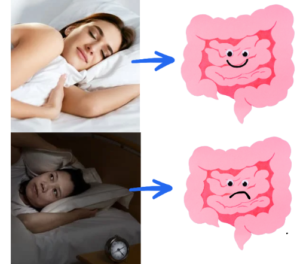Exploring the Essential Connection Between Quality Sleep and Optimal Digestive Health
Sleep is not just a time for rest; it plays a fundamental role in regulating our overall digestion and gut health. This complex relationship may seem subtle, yet it involves numerous physiological functions that operate in harmony. The body’s circadian rhythm, often termed the internal biological clock, effectively aligns our sleep patterns with our digestive processes. This synchronisation is highlighted by the common experience of feeling hungry at similar times daily, demonstrating the body’s remarkable ability to maintain balance with natural biological cycles.
Why Quality Sleep is Crucial for Optimising Digestive Function and Health 
Quality sleep is vital for the body’s capacity to heal, rejuvenate, and restore its various systems, particularly the digestive system. The deeper stages of sleep are especially critical for these restorative functions. During profound sleep cycles, the organs, tissues, and cells that form the digestive system not only relax but also engage in essential repair processes. The body prioritises cellular repair and regeneration during these deep sleep phases, notably for the cells lining the digestive tract, which constantly endure damage from food particles and digestive enzymes. This regeneration is crucial for preserving the integrity of the gastrointestinal lining, thus enhancing the effectiveness of digestion.
Deep sleep also significantly contributes to fortifying the immune system, which is particularly vital for the digestive system, as it houses specialised immune cells activated by beneficial bacteria present in the gut. These immune cells are essential for safeguarding the gut and the entire digestive system against harmful microorganisms, ensuring a balanced ecosystem of bacteria within the gut environment. A strong immune response is instrumental in defending against infections and maintaining overall gut health—two essential components for effective digestion.
Moreover, the organs that make up the digestive system are crucial for detoxification, which aids in eliminating waste and harmful substances from the body. Deep sleep enhances this detoxification process, improving the operational efficiency of the liver and kidneys, thus enabling these essential organs to function at their best. This synergistic relationship between sleep and detoxification significantly boosts overall digestive health and well-being, underscoring the importance of prioritising restorative sleep for maintaining a healthy body.
Exploring the Connection Between Gut Motility and Sleep Quality
A fundamental element of digestion is the effective movement of food and waste through the digestive tract, commonly known as gut motility. Importantly, this process undergoes notable changes during sleep. Throughout both deep and light sleep, the rate of gut motility significantly decreases. This reduction is a necessary adjustment that allows the digestive system to conserve energy, which is then redirected towards the repair and regeneration of digestive tissues. By conserving energy during sleep, the digestive process can operate more efficiently when awake, optimising nutrient absorption and waste elimination.
The migrating motor complex is crucial for the cycle of contractions that occur during fasting periods, including during sleep. This cycle is essential for gut motility, as it efficiently clears food particles and residues that may remain in the digestive system. This natural cleansing mechanism of the digestive tract reduces the risk of bacterial overgrowth, thereby fostering a healthy gut environment. Notably, the migrating motor complex is most active during the night when individuals are fasting and asleep, highlighting the vital role of sleep in safeguarding the health of the digestive system.
As morning approaches, gut motility gradually increases, preparing the digestive system to effectively process and digest food. This increase in motility can also signal the first bowel movement of the day, illustrating the finely tuned connection between sleep and gut motility. Understanding this relationship is vital for optimising digestive health and enhancing overall well-being.
Investigating Hormonal Interactions that Influence Sleep and Digestive Health
Ghrelin, often referred to as the hunger hormone, plays a pivotal role in stimulating appetite. Conversely, leptin signals to the brain when the stomach is full, aiding in the prevention of overeating. Together, these hormones are essential for regulating appetite; however, their functions can be disrupted by insufficient sleep.
Just one night of inadequate sleep can increase levels of ghrelin, resulting in heightened appetite and often triggering cravings for carbohydrates. This phenomenon, commonly described as feeling ‘hangry’, can be further exacerbated by a decrease in leptin levels following insufficient sleep, disrupting the signals that indicate fullness. This creates a problematic situation where individuals may overindulge and struggle to heed their body’s signals to stop eating. While occasional poor sleep may not lead to severe consequences, chronic insomnia can result in significant digestive issues, including gut inflammation, liver disorders, gastroesophageal reflux disease, inflammatory bowel disease, and even colorectal cancer, while also contributing to weight gain.
The Consequences of Sleep Disruption on Digestive Health
Disruptions in sleep can give rise to a variety of digestive issues. Factors such as shift work—especially night shifts—and experiencing jet lag can significantly disturb sleep patterns, throwing the body’s internal clock out of sync. Furthermore, consuming food late at night or maintaining irregular meal schedules can adversely impact sleep quality. The circadian rhythm, which regulates sleep, is closely linked to natural sunlight, a crucial element for sustaining a healthy sleep-wake cycle.
Unfortunately, in our modern technology-driven lifestyle, many people spend the majority of their daytime indoors, leading to reduced exposure to natural light. This shift has resulted in increased exposure to blue light emitted by devices such as laptops, televisions, and smartphones, which further disrupts the sleep cycle and overall sleep patterns, particularly when this exposure occurs shortly before bedtime.
The cumulative effects of these factors can lead to serious digestive issues, including diarrhea, ulcers, inflammatory bowel disease, or disruptions in the delicate balance between beneficial and harmful bacteria in the gut. Such imbalances can also compromise the gut lining, complicating existing challenges related to digestive health.
Improving Microbiome Health Through Quality Sleep Practices
microbiome refers to the vast array of microorganisms residing in the gut, primarily comprising beneficial bacteria known as probiotics, along with viruses, fungi, and potentially harmful bacteria. These microbes are vital not only for overall health but also for digestive health. They enhance the immune response and assist in digestion, facilitating the production of key vitamins, enzymes, hormones, and amino acids. Recent research has established a significant link between the microbiome and sleep, indicating that disrupted sleep or chronic insomnia can adversely affect the balance of these microbes, ultimately impacting both digestive health and general well-being.
Investigating the Complex Interactions Between Microbiome Health and Sleep Quality
The relationship between sleep and microbiome health is complex and multifaceted. Poor sleep can have negative effects on microbiome health, while an imbalanced microbiome can also detrimentally affect sleep quality. To comprehend this intricate relationship, one study found a correlation between a higher abundance of specific bacterial types in the gut and quicker sleep onset, along with fewer nighttime awakenings. Although this article does not explore all findings in detail, the key takeaway is that nurturing a diverse and plentiful population of beneficial bacteria in the gut is crucial for achieving optimal sleep, efficient digestion, and maintaining overall health.
Understanding the Interconnections Between Stress, Sleep, and Digestive Health
A common consequence of stress and anxiety is disrupted sleep. Conversely, these mental health challenges can also negatively impact the physical health and functionality of the digestive system. Such disruptions may lead to altered gut motility and contribute to issues such as indigestion, ulcers, and irritable bowel syndrome. A critical factor in this dynamic is the role of the so-called stress hormone, cortisol.
Understanding How Cortisol Affects Digestive Processes
When cortisol levels rise, the body responds by entering a fight-or-flight state. This physiological response redirects blood flow to critical areas such as the heart, brain, lungs, and muscles, while diverting it away from the digestive system. This reaction prepares the individual to either confront danger or flee, a response that was essential for survival in ancient times.
In today’s world, however, stressors are often less life-threatening, such as financial pressures, work-related stress, or inadequate sleep. While short-term redirection of blood flow may be beneficial in acute situations, chronic stress can have harmful consequences for the digestive system, particularly regarding gut motility. This can result in symptoms such as constipation, diarrhea, indigestion, gas, and bloating. Therefore, implementing effective stress management strategies is essential for supporting both gut health and achieving quality sleep.
Ensuring adequate sleep is crucial for maintaining a healthy digestive system, as the connection between sleep and digestion is inherently intertwined. Prioritising effective sleep hygiene practices is vital for achieving restorative sleep. This includes reducing exposure to blue light from electronic devices, adhering to a consistent sleep schedule, creating a cool and dark sleep environment, avoiding food consumption within two hours of bedtime, and ensuring ample exposure to natural light throughout the day, especially in the morning.
References
Understanding Digestive Health and Circadian Rhythms
Exploring Sleep Dysfunction and Digestive Conditions
Examining the Link Between the Gut Microbiome and Sleep
Investigating Stress and Its Effects on the Digestive System
The Article: How Sleep Affects Your Digestive System appeared first on https://janestevensnutrition.com
The Article: Sleep’s Impact on Your Digestive System Explained appeared first on https://janestevens.net
The Article Sleep’s Impact on Digestive Health Explained Was Found On https://limitsofstrategy.com



